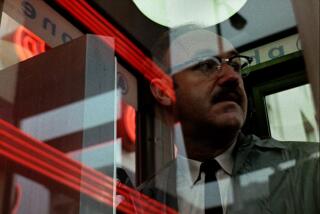Renewing Charlie’s Classics
- Share via
Charlie Chaplin has never looked better than he does in “The Chaplin Mutuals: Remastered,” Kino on Video’s digitally remastered collection of 12 of his legendary shorts (packaged on three cassettes, $20 each).
The 26-year-old Chaplin was the biggest star in movies when he left Essanay Studios in 1916 and signed with the Mutual Film Corp. for an unprecedented salary of $10,000 per week, after an initial bonus of $150,000. Mutual also insured Chaplin’s life for $250,000.
In his statement to the press about his healthy contract, Chaplin mused: “A great many people are inclined to make wide eyes at what is called my salary. Honestly, it is a matter I do not spend much time thinking about. Money and business are very serious matters, and I have to keep my mind off of them. In fact, I do not worry about money at all. It would get in the way of my work. I do not think that life is a joke to me, but I do enjoy working on the sunny side of it.”
Chaplin later said his two years at Mutual were the happiest of his life. They were also one of his most creative periods of filmmaking. In 1916 and 1917, Chaplin wrote, directed, starred in and produced his best short comedies, which laid a foundation for his later feature-length career.
Among the Kino offerings are the seriocomic “The Immigrant” (1917), in which the Little Tramp arrives in America from Europe; “Easy Street,” also from 1917, which finds the Little Tramp becoming a policeman on the most crime-ridden street in New York; “One A.M.,” from 1916, in which Chaplin demonstrates his physical prowess as a drunk trying to make his way up the stairs in his house; and “The Pawnshop,” also from 1916, which features Chaplin thwarting a robbery at the pawnshop where he works.
Though these Mutual comedies have been available on video before--Kino released a collection in 1984--this edition marks the first time the films have been mastered. Film historian David Shepard restored the 12 films by first creating a master print from the best surviving 35-millimeter prints, instead of relying on old prints that have long been in circulation.
These 35-millimeter negatives, which were composed of the remains of the fragile original nitrate-base camera negatives and other early-generation material, were then mastered digitally, eliminating a lot of the ravages of time.
The “Digital Vision Noise Reduction” process wiped out the majority of black-and-white flecks on the prints. Other electronic technology was able to “paint out” such film damage as splice lines, flaked emulsion and punch marks.
The result is remarkably pristine.
Michael Mortilla, the composer of the lively scores for Kino’s 1984 release of Chaplin Mutual comedies, has revised, orchestrated and recorded his music in digital stereo.
Here’s a breakdown of what shorts are featured in the collection:
Volume One: “The Immigrant” (1917), “The Adventurer” (1917), “The Cure” (1917), “Easy Street” (1917).
Volume Two: “The Count” (1916), “The Vagabond” (1916), “The Fireman” (1916), “Behind the Screen” (1916).
Volume Three: “One A.M.” (1916), “The Pawnshop” (1916), “The Floorwalker” (1916), “The Rink” (1916).
To order, call (800) 562-3330.
More to Read
Only good movies
Get the Indie Focus newsletter, Mark Olsen's weekly guide to the world of cinema.
You may occasionally receive promotional content from the Los Angeles Times.







